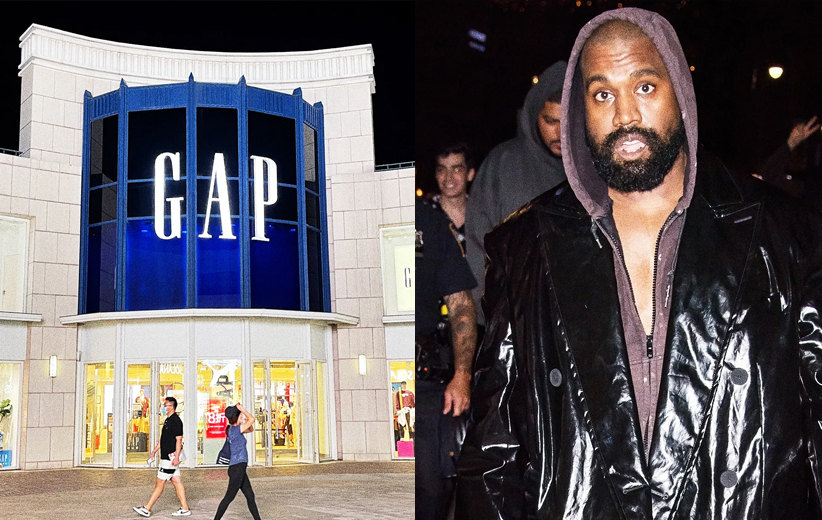
In a seismic development within the fashion industry, Kanye West, now officially recognized as Ye, has brought an abrupt end to the Yeezy Gap partnership, a venture initially poised to span a decade but cut short after just two years. The collaboration, conceived to deliver high-quality, trend-forward, and affordable Yeezy Gap apparel to a wider audience, held ambitious revenue projections of $1 billion over the planned 10-year period. However, a breach of contract by Gap, according to Ye, has led to the dissolution of the partnership, with the artist now setting his sights on establishing independent Yeezy stores.
The unexpected termination follows a breach-of-contract notice served by Kanye’s legal team to Gap on August 16, asserting that the retail behemoth had violated the terms of their agreement. Gap responded on August 23, but the resolution offered proved unsatisfactory for Kanye, prompting him to officially sever ties with the company.
Mark Breitbard, Gap’s president, confirmed the conclusion of the partnership in a message to employees, stating, “While we share a vision of bringing high-quality, trend-forward, utilitarian design to all people through unique omni experiences with Yeezy Gap, how we work together to deliver this vision is not aligned. And we are deciding to wind down the partnership.”
Ye took to CNBC to elaborate on the situation, his trademark cap, beard, and sunglasses framing a reflection on the twists and turns of the collaboration. He expressed his disillusionment with the trajectory of the collaboration, emphasizing a longstanding dream of delivering top-notch products to the masses at an affordable price point — specifically, $20. Kanye alleged that Gap deviated from this vision by selling one of his shirts for $19 and pricing other items well above his intended range.
Moreover, Ye lamented the lack of alignment with Gap’s leadership, citing frustrations with the design process, pricing decisions, and unfulfilled promises of brick-and-mortar stores. He revealed that despite his efforts to inject high-profile collaborations into the project, such as enlisting Demna Gvasalia, the lead designer of Balenciaga, the final product did not meet his expectations. Ye highlighted issues with colorways and the product being showcased on sites without his approval.
In the CNBC interview, Kanye reflected on his family’s background in fashion, describing them as “garmentos” who played a role in the early days of bootleg jogging suits and streetwear. Drawing a parallel between himself and other influential figures in the fashion industry like Virgil Abloh and Demna, Ye asserted his position as a leader in shaping the clothing language, emphasizing the term over “aesthetic.”
The artist further expounded on the challenges encountered during the three-year collaboration with Gap, emphasizing the inevitable struggles and back-and-forths inherent in attempting to forge something new and integrate disparate teams. Despite designing an entire collection, Kanye asserted that he was unable to set the actual prices he desired for his creations. He alleged that Gap took one of his shirts and sold it for $19, significantly below the intended price point of $200.
Kanye continued by expressing disappointment with Gap’s handling of pop-up stores, a component he had signed on for based on the contract’s assurance that Gap would establish physical retail spaces. However, this aspect of the collaboration, according to Ye, was consistently ignored. His frustration stemmed from a perceived lack of commitment and follow-through on the part of Gap’s leadership.
In recounting the collaborative process, Kanye underscored the extent of his commitment, investing not only his creative energy but also leveraging his influential relationships within the fashion industry. He cited the involvement of Demna Gvasalia, known for his work with Balenciaga, as a prime example. Yet, despite such efforts, Kanye expressed profound dissatisfaction with the product’s outcome, claiming that certain colorways and design elements were executed without his approval.
In conclusion, Ye’s decision to terminate the Yeezy Gap partnership represents a decisive move towards autonomy and creative control. As he bids farewell to Gap, the fashion community eagerly anticipates what lies ahead for Yeezy stores. Kanye West’s impact on the fashion landscape is undeniably colossal, and with the prospect of independent ventures, the world watches to see how he will redefine the boundaries of innovation and influence within the industry.
